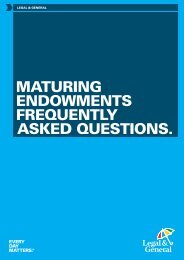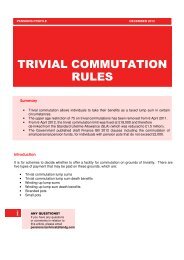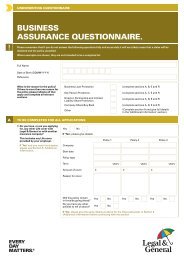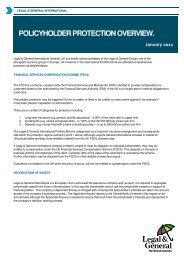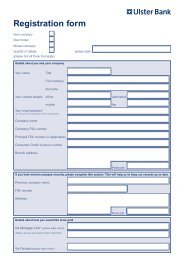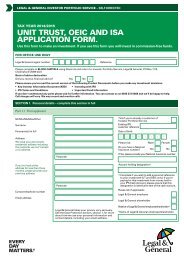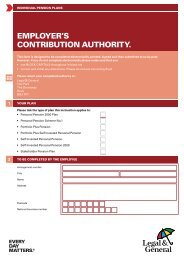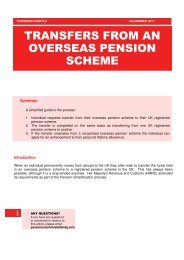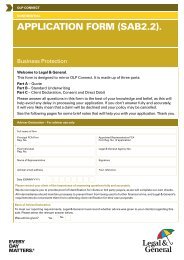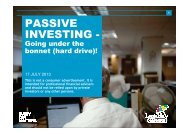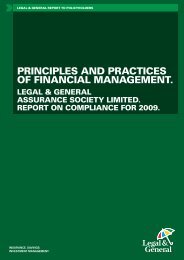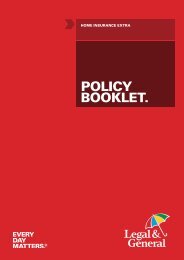INVESTMENT OPTIONS. - Legal & General
INVESTMENT OPTIONS. - Legal & General
INVESTMENT OPTIONS. - Legal & General
Create successful ePaper yourself
Turn your PDF publications into a flip-book with our unique Google optimized e-Paper software.
Individual AND GROUP pensionS – Investment options<br />
31<br />
FUND SPECIFIC RISK DEFINITIONS.<br />
Listed below are all of the fund specific risks that<br />
could potentially apply to the funds. To find out which<br />
risks apply to a fund you need to cross-reference<br />
the numbers in the fund specific risks section of the<br />
fund information with the corresponding numbered<br />
definitions below.<br />
You’ll note that there are some numbers missing from<br />
the list. This is because we use standard descriptions<br />
for a number of different products and some of those<br />
numbers do not apply to the funds available to the<br />
pension products covered within this document.<br />
12. Currency changes<br />
The fund may hold assets in currencies that are not<br />
sterling (British pounds). If the value of these currencies<br />
falls compared to sterling this may cause the fund’s value<br />
to go down.<br />
13. Equities<br />
As the fund invests in equities (shares of companies),<br />
there’s a higher risk of fund values falling than investing in<br />
most other asset types, particularly in the short term.<br />
14. Fixed interest securities<br />
The fund invests in fixed interest securities – usually<br />
corporate and government bonds. Investment returns<br />
are particularly sensitive to longer term interest rates,<br />
typically those for five years and more. Fund values are<br />
likely to fall when these interest rates rise.<br />
The financial strength of a company or government<br />
issuing a fixed interest security determines their ability<br />
to make some or all of the payments due. If this financial<br />
strength weakens, the chances of them not making<br />
payments increases and this could reduce the<br />
fund’s value.<br />
16. Sub investment grade corporate bonds<br />
Corporate bonds are assessed by independent analysts.<br />
They rate them depending on how likely the company<br />
who issues the bond is to fail to pay the interest due<br />
and/or repay the original capital on the agreed date.<br />
They’re divided into two categories:<br />
• ‘Investment grade’. These are bonds with the least risk.<br />
• ‘Sub investment grade’. These bonds are more risky<br />
than investment grade bonds.<br />
The fund invests in sub investment grade corporate bonds<br />
so there’s an increased risk of fund values falling due to<br />
non-payment by the companies issuing the bonds.<br />
17. Derivatives<br />
This fund invests in derivatives and so may be higher risk<br />
than funds that invest in other types of assets. In addition,<br />
there are some derivatives whose value falls even though<br />
the market is rising.<br />
If any of the companies with whom the fund has taken<br />
out a derivative experiences financial difficulties, it may<br />
be difficult to value the derivative or for it to be sold. This<br />
may reduce the value of your investment.<br />
19. Smaller companies<br />
The fund invests in smaller companies that tend to be<br />
riskier than large companies. This is because their shares<br />
can be harder to buy and sell, and the value of them may<br />
go up and down more often and by larger amounts,<br />
particularly in the short term.<br />
20. Limited holdings<br />
Most funds spread investments across lots of individual<br />
holdings, rather than relying on the performance of just a<br />
few. The whole of this fund, or a large part of it, invests in<br />
relatively few individual holdings. This means that a fall in the<br />
value of an individual holding can have a major impact on the<br />
overall performance of the fund.<br />
21. Developing markets<br />
The fund invests in countries where investment markets are<br />
not as well developed as those in the UK. This means that<br />
investments are generally riskier than those in the UK<br />
because they:<br />
• are not as well regulated,<br />
• are more difficult to buy and sell,<br />
• have less reliable arrangements for the safekeeping of assets.<br />
22. Specialist<br />
The fund invests in companies from a particular market<br />
sector which means that there is a higher level of risk. The<br />
value of your investment may go up and down more often<br />
and by larger amounts than funds that are spread more<br />
widely, particularly in the short term.<br />
23. Commercial property<br />
Property can be difficult to buy or sell. This could mean:<br />
• cash remains uninvested and/or<br />
• property may have to be sold for less than expected.<br />
If an unexpected large number and/or value of withdrawals<br />
are requested:<br />
• The fund manager may be forced to sell properties quickly.<br />
This could mean that properties are sold for less than<br />
expected which could reduce the value of your investment.<br />
• There are times when it’s not possible to sell properties<br />
quickly. If this happened at the same time as you asking us<br />
to withdraw money from the fund, we might need to delay<br />
dealing with your request. You could wait for as long as six<br />
months.<br />
If the size of the fund falls significantly, the fund may have to<br />
hold fewer properties. This may lead to an increase in risk.<br />
Rental growth is not guaranteed and unpaid rent could affect<br />
the performance of your investment.<br />
The value of property is generally a matter of a valuer’s<br />
opinion rather than fact.<br />
24. Money market insolvency<br />
The fund invests in money market assets, which includes<br />
deposits in banks and other financial institutions. If any of<br />
these suffer financial difficulties or become insolvent, they<br />
may not pay back some or all of the amount invested with<br />
them. This could mean that you might not get back the full<br />
value of your investment.<br />
27. Ethical<br />
The ethical standards used for this fund mean that it cannot<br />
invest in some companies or in certain sectors (for example<br />
tobacco or mining). These restrictions mean that the value<br />
of your investment may go up and down more often and<br />
by larger amounts than a fund without such restrictions,<br />
particularly in the short term.



